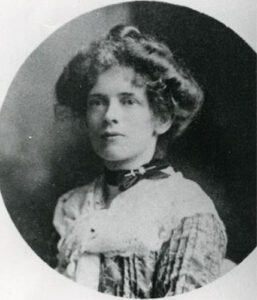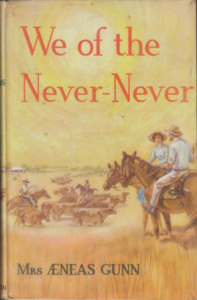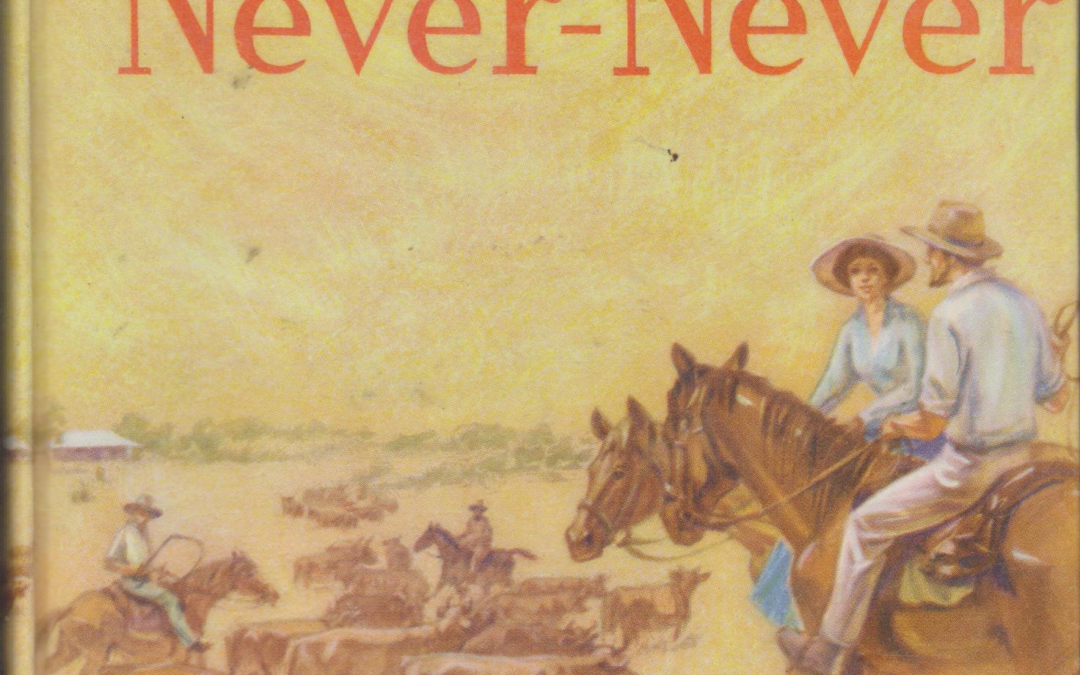by Jeannie Gunn
 Mrs Gunn, having just arrived at Elsey Station in remotest NT in 1902, deals with the staff question; bringing to an end for the time being our series on female servants – Indigenous, convict and free – in the nineteenth and early twentieth centuries.
Mrs Gunn, having just arrived at Elsey Station in remotest NT in 1902, deals with the staff question; bringing to an end for the time being our series on female servants – Indigenous, convict and free – in the nineteenth and early twentieth centuries.
[Mac, the head stockman who had been in charge of the station prior to the arrival of the Gunns, departs taking with him Bertie, “his right hand boy”, and Bertie’s partner, Nellie, who had proved a competent housekeeper]
So many lubras put themselves on the homestead staff to fill the place left vacant by Nellie, that the one room was filled to overflowing while the work was being done, and the Măluka [Gunn] was obliged to come to the rescue once more. He reduced the house staff to two, allowing a shadow or two extra in the persons of a few old black fellows and a piccaninny or two, sending the rejected to camp.
In the morning there was a free fight in camp between the staff and some of the camp lubras, the rejected, led by Jimmy’s lubra—another Nellie—declaring the Măluka had meant two different lubras each day.
Again there was much ear-splitting argument, but finally a compromise was agreed on. Two lubras were to sit down permanently, while as many as wished might help with the washing and watering. Then the staff and the shadows settled down on the verandah beside me to watch while I evolved dresses for two lubras out of next to nothing in the way of material.
[Time passes. A carpenter arrives to make a start on a new homestead]
 [T]o add to the general hubbub, the servant question had opened up again. Jimmy’s Nellie, who had been simmering for some time, suddenly rebelled, and refused to consider herself among the rejected.
[T]o add to the general hubbub, the servant question had opened up again. Jimmy’s Nellie, who had been simmering for some time, suddenly rebelled, and refused to consider herself among the rejected.
We said there was no vacancy on the staff for her, and she immediately set herself to create one, by pounding and punching at the staff in private. Finding this of no avail, she threatened to “sing” Maudie dead, also in private, unless she resigned. Maudie proving unexpectedly tough and defiant, Nellie gave up all hope of creating a vacancy, and changing front, adopted a stone-walling policy. Every morning, quietly and doggedly, she put herself on the staff, and every morning was as quietly and doggedly dismissed from office.
Doggedness being an unusual trait in a black fellow, the homestead became interested. “Never say die, little ’un,” the Măluka laughed each morning; but Dan was inclined to bet on Nellie.
“She’s got nothing else to do, and can concentrate all her thoughts on it,” he said, “and besides, it means more for her.”
It meant a good deal to me, too, for I particularly objected to Jimmy’s Nellie partly because she was an inveterate smoker and a profuse spitter upon floors; partly because—well to be quite honest—because a good application of carbolic soap would have done no harm; and partly because she appeared to have a passion for exceedingly scanty garments, her favourite costume being a skirt made from the upper half of a fifty-pound calico flour bag. Her blouses had, apparently, been all mislaid.
Nellie, unconscious of my real objections, daily and doggedly put herself on the staff, and was daily and doggedly dismissed. But as she generally managed to do the very thing that most needed doing, before I could find her to dismiss, Dan was offering ten to one on Nellie by Easter time.
[A few weeks pass. The wagons arrive from Katherine.The missus gets a new Chinese cook, Cheon, replacing Sam]
The only disadvantage we could associate with his coming was that by some means Jimmy’s Nellie had got on to the staff. No one seemed to know when or how it had happened, but she was there, firmly established working better than any one else, and Dan was demanding payment of his bets.
Cheon would not hear of her dismissal. She was his “right hand,” he declared; and so I interviewed Nellie and stated my objections in cold, brutal English, only to hate myself the next moment; for poor Nellie, with a world of longing in her eyes, professed herself more than willing to wear “good fellow clothes” if she could get any.
“Missus got big mob,” she suggested as a hint; and, although that was a matter of opinion and comparison, in remorse I recklessly gave her my only bath wrapper, and for weeks went to the bath in a mackintosh.
Nellie was also willing to use as much carbolic soap as the station could afford; but as the smoking and spitting proved more difficult to cope with, and I had discovered that I could do all the “housework” in less time than it took to superintend it, I made Cheon a present of the entire staff, only keeping a lien on it for the washing and scrubbing. The lubras, however, refused to be taken off my visitor’s list and Cheon insisting on them waiting on the missus while she was attending to the housework, no one gained or lost by the transfer.
Cheon had a scheme all his own for dealing with the servant question: the Măluka should buy a little Chinese maiden to wait on the missus. Cheon knew of one in Darwin, going cheap, for ten pounds, his—cousin’s child. “A real bargain!” he assured the Măluka, finding him lacking in enthusiasm; “docile, sweet, and attentive,” and yes,—Cheon was sure of that—“devoted to the missus,” and also a splendid pecuniary investment (Cheon always had an eye on the dollars). Being only ten years of age, for six years she could serve the missus, and would then bring at least eighty pounds in the Chinese matrimonial market in Darwin—Chinese wives being scarce there. If she grew up moon-faced, and thus “good-looking,” there seemed no end to the wealth she would bring us.
It took time to convince Cheon of the abolition of slavery throughout the Empire, and even when convinced, he was for buying the treasure and saying nothing about it to the Governor. It was not likely he would come in person to the Elsey, he argued, and, unless told, would know nothing about it.
But another fat, roundabout, roly-poly of humanity was to settle the servant question finally, within a day or two. “Larrikin” had been visiting foreign parts at Wandin, towards the west, and returning with a new wife, stolen from one “Jacky Big-Foot,” presented her to the missus.
“Him Rosy!” he said, thus introducing his booty and without further ceremony Rosy requested permission to “sit down” on the staff. Like Cheon she carried her qualifications on the tip of her tongue: “Me savey scrub ’im, and sweep ’im, and wash ’im, and blue ’im, and starch ’im,” she said glibly, with a flash of white teeth against a babyish pink tongue. She was wearing a freshly washed bright blue dress, hanging loosely from her shoulders, and looked so prettily jolly, clean, capable, and curly-headed, that I immediately made her housemaid and Head of the Staff.
“Great Scott!” the Măluka groaned, “that makes four of them at it!” But Rosy had appealed to me and I pointed out that it was a chance not to be missed and that she was worth the other three all put together. “Life will be a perennial picnic,” I said, “with Rosy and Cheon at the head of affairs”; and for once I prophesied correctly.
.
Jeannie Gunn
We of the Never Never
first pub. 1908
256pp





